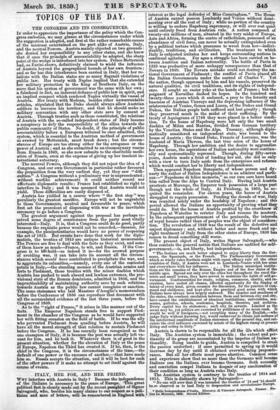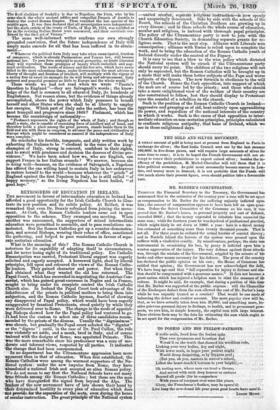ITALY, HER FOE, AND HER FRIEND.
Wily interfere with Austria in Italy ? Because the independence of the Italians is necessary to the peace of Europe. This great political fact is clearly made out by the recent pamphlet of Signor Salvagnoli, who, besides his many claims to our respect as a poli- tician and man of letters, will be remembered in England with
interest as the legal defender of Miss Cumiinghem.• The House of Austria cannot possess Lombardy and Venice without domi- neering over all the rest of Italy ; while no portion of the country is willing to endure Hapsburg supremacy, or will ever rest quiet until entirely freed from Austrian rule. A nation composed of twenty-six millions of men, situated in the very midst of Europe, Asia and Africa, forming the centre of catholicism, possessed of an abundance of civil force, can never be actually extinguished even by a political torture which presumes to wrest from her—indivi- duality, traditions, and civilization. The treatment to which Italy is subjected irritates her and keeps surrounding nations in continual agitation. For ages a struggle has been carried on be- tween Austrian and Italian nationality. The battle of Pavia in 1525 was productive of more unhappy consequences than that of Novara in 1849. The Novara mistake could not destroy the na- tional Government of Piedmont ; the conflict of Pavia placed all the Italian Governments under the control of Charles V. Yet the nation, though oppressed by him and his vassals, preserved its natural qualities, its civil traditions, and its rights of independ- ence. It sought an easier yoke at the hands of France ; but the poignard of Reveille° dashed its hopes. In the hundred and twenty-three years which it endured, a prey to the ferocity and baseness of Austrian Viceroys and the depressing influence of the aristocracies of Venice, Genoa and Lucca, of the Dukes and Grand Dukes, the Italian people both suffered and lost greatly ; though they preserved much in the midst of their suffering. By the treaty of Aquisgrana of 1748 they were placed in a better condi- tion. To the house of Hapsburg were left only the two small duchies of Milan and Mantua, divided from German territory by the Venetian States and the Alps. Tuscany, although diplo- matically considered an independent state, was bound to the house of Austria ; the Grand Duke, Francis of Lorraine, was the husband of Maria Theresa, the last true scion of the house of Hapsburg. Through her ambition and the desire to aggrandize her own house, the aspirations of Italian nationality were continu- ally and systematically repressed. Though, during fifty-seven years, Austria made a feint of lending her aid, she did so only with a view to turn Italy aside from the enterprises and reforms which would conduct her to liberty and independence. Then appeared Napoleon Bonaparte, of whose person and dy- nasty the author of Italian Independence is an admirer and parti- san—" Napoleone di felice memoria," as our own ears have heard him called from the Alps to. Central Italy. Having laid Austria prostrate at Marengo, the Emperor took possession of a large part though not the whole of Italy. At Presburg, in 1805, he ac- quired the remainder. For eleven years, the house of Austria struggled to regain possession. Pending the decade of war, Italy was reunited solely under the headship-'of Napoleon ; and this period allowed the Italians an opportunity of proving what they could do. But the house of Austria profited by the overthrow of Napoleon at Waterloo to reenter Italy and resume its mastery. In the subsequent apportionment of the peninsula, the interests of royal houses rather than of peoples was the object of considera- tion. The revolution of 1848 was the result of the defective and unjust diplomacy; and, without better and more frank and up- right treatment of Italy from the other states of Europe, 1859 has reason to dread something still worse.
The present object of Italy, writes Signor Salvagnoli,—who thus combats the general notion that Italians are unfitted for self- government,—is, not liberty, but independence.
" The Italians are much better adapted to enjoy liberty than the Ger- mans, the Spaniards, or the French. The Parliamentary Government which so wisely rules Sardinia might with equal efficacy rule all the other countries of Italy, if Austria were not in Lombardo-Venice with her arms
and everywhere with her influence The Italian municipal institu- tions are the remains of the Roman Empire and of the free states of the middle ages. Spread not only over the cities but throughout the rural dis- tricts and small towns, they have served to maintain the habit of self-go- vernment. Confraternities for study, religion, commerce, charity, and re- creation, have united all classes, afforded opportunity for the display of talent of every kind, given occasion for discussion, for the practice of com- mand and obedience, and kept alive the practical good sense with which Italians have always been largely endowed. The number and smallness of the states, the constant emulation between them and between city and city, have caused the establishment of identical institutions, universities, mu- seums, galleries, schools, academies, hospitals, theatres and archives. Every capital has its statesmen ; each city its savants. Limited as the arena may be, yet politics are exercised by politicians of no mean rank. It would be well if foreigners —not excepting many of the English,—who judge Italy without knowing her, would endeavour to obtain just notions of the intellectual amplitude of Italian statesmen of the present day, and cal- culate the civil influence exercised by minds of the highest stamp at present living and acting in Italy."
Austria is shown to be responsible for all the ills which afflict Italy. The Austrian system is immutable ; the extent and per- tinacity of its grasp are necessitated. by the impetus of Italian na- tionality. Being unable to guide, Austria is compelled to crush the passion underfoot ; if once permitted to spring up it would increase day by day until it obtained overwhelming preponde- rance. But all her efforts must prove abortive. Common sense and experience show that no more than the Germans will become Italians can the Italians ever become Germans. Both necessity and conviction compel Italians to despair of any amelioration of their condition so long as Austria rules Italy. The Austrian system is contrary to the treaties of 1814 and 1815. This is distinctly shown by Salvagnoli-
" No one will aver that it was intended the treaties of '14 and '15 should be, so observed as to lead Italy to desperation and revolutionize Europe.
• Della Independenza d'Italia. Discorso di Vincenzo Salvagnoli. Firenze. Fe- lice Le Monnier, 1859. Second Edition.
The final abolition of feudality is due to Napoleon the First, who by his arms shook the whose ancient edifice and compelled Francis of Austria to destroy the sacred Roman Empire. Thus vanished the last spectre of the middle ages. It was then declared that all sovereignties were independent : but the sixth article of the treaty of Paris, of May 30, 1814, was nullified as far as the reviving Italian States were concerned, and their servitude con- firmed by the final act of Vienna."
The same well-informed writer confirms our own strongly grounded conviction, that the future independence of Italy will amply make amends for all that has been suffered in its attain- ment— " Whatever the political form Italy may take when emancipated, freedom of commerce, which is already Piedmontese and Tuscan law, will become national law. To pass from material to moral prosperity, no doubt liberated Italy will reproduce those prodigies of beauty which embellish and aug- ment civilization. The works of science and the fine arts, which have never failed in the most calamitous times, under Governments the most adverse to liberty of thought and freedom of intellect, will multiply with the vigour of a nation free to exert its strength for its well being and advancement. Italy restored and peaceful promises no little to Europe and the whole world." These words we had not read when we wrote "Poerio's Question to England "—they are Salvagnoli's words ; the know- ledge of the fact is common to all educated Italy, (to hundreds of Englishmen. Not reason alone, but the evidence of things already accomplished, shows the power which Italy possesses to benefit herself and other States when she shall be at liberty to employ her energies. Which part of Italy asks the author, has been the most tranquil and progressive since 1849 ? Piedmont, which has become the countersign of nationality— "Piedmont represents the rights of the whole of Italy ; and though so small a state, she is capable of exercising force of intellect and of hand, and therefore holds a place among the great powers, stands beside them in the field and sits with them in congress, to advance the peace and civilization of Europe which might be considered as assured if the independence of Italy were complete." He concludes his forcible, temperate, and ably written work by exhorting the Italians to be " obedient to the voice of the king- champion of Italy, strong in concord, confident in their rights, and to await with prudence and decision the decrees of divine pro- vidence." We have been asked how we, who are English, can support France in her Italian crusade ? We answer, because she is doing well—because, on the evidence of Salvagnoli, a Napoleon has offered the one willing hand to sustain Italy in her endeavour to restore herself to the world—because whatever the " griefs " of England against the first Napoleon in Italy, he is still called " of happy memory," as the living Napoleon has been hailed, " of good hope."



























 Previous page
Previous page